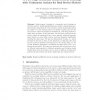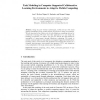688 search results - page 41 / 138 » Using reinforcement learning to adapt an imitation task |
GECCO
2011
Springer
13 years 13 days ago
2011
Springer
The reward functions that drive reinforcement learning systems are generally derived directly from the descriptions of the problems that the systems are being used to solve. In so...
MICAI
2009
Springer
14 years 3 months ago
2009
Springer
Reinforcement Learning is a commonly used technique in robotics, however, traditional algorithms are unable to handle large amounts of data coming from the robot’s sensors, requi...
IJCNN
2006
IEEE
14 years 3 months ago
2006
IEEE
— We propose a method that takes observations of a random vector as input, and learns to segment each observation into two disjoint parts. We show how to use the internal coheren...
ICCSA
2004
Springer
2004
Springer
Task Modeling in Computer Supported Collaborative Learning Environments to Adapt to Mobile Computing
14 years 2 months ago
Using the new wireless technologies, mobile devices with small displays (handhelds, PDAs, mobile phones) are present in many environments. We are interested in the effective use of...
NIPS
1994
13 years 10 months ago
1994
It is widely accepted that the use of more compact representations than lookup tables is crucial to scaling reinforcement learning (RL) algorithms to real-world problems. Unfortun...


